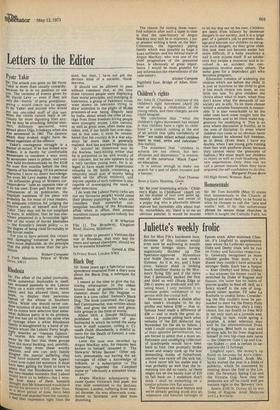Children's rights
Sir: John H. Chambers' criticism of the children's right movement (April 28) was as strong a vindication of the young rebels, and their charges, as.one could imagine.
His conclusion that " what the children's rights movement has missed is that children have a right to childhood " is comical, coming at the end of an article that talks confidently of how "we make infant school children learn to read, write and calculate" (his italics).
The statement that "children in schools are not clients, but beneficiaries and dependants" is reminiscent of the notorious ' Black Paper' on education.
It is almost enough to make one search for a pair of short trousers and a banner.
Noel Thomas Bron-y-Garn, Maesteg. Glam Sir: Re your interesting article, ' Children's Right to Childhood' (April 14). As the mother of four now quite agreeably adult children, and owner of a puppy dog who is physically almost mature but incredibly silly about traffic, motorbikes, etc, there is to me an obvious parallel. It would be murder to let my dog out on his own. Children are beset from infancy by immense dangers in our society, and it is a large part of a parent's job to prevent damage 'and educate our children to recognise such dangers. As they grow older this task does not become easier but more difficult. If a baby swallows a nail it only injures itself. If an adolescent boy swipes a motorcar and is involved in an accident the consequences involve many others. The same goes for a dependent girl who becomes pregnant.
Education consists of widening the choices which are before the child. It is just as injurious to the child to give. it too much choice too soon, as too little too late. To give children the choice about what to learn, when they don't know what the demands of our society are, is silly. To let them choose within a sensible framework is reasonable. It is also remarkable to let the older ones have some insight into the framework, and to let them make suggestions for modifying it. This is an area where discussion is fruitful, as in the area of discipline. In areas where children can come to no obvious harm they should be allowed full freedom, as in dress. (Even there I have my doubts, when I see young girls ruining their feet with platform shoes because they cannot resist the pressures of fashion.) We must teach our children to reject as well as rush headlong into new experiences. Only then can we call a person mature when they have acquired the self-confidence to do this.
Margaret Pryce-Born 103 High Street, Weston, Bath


































 Previous page
Previous page